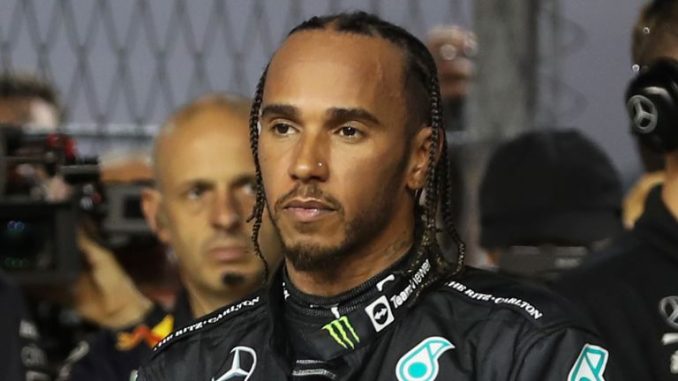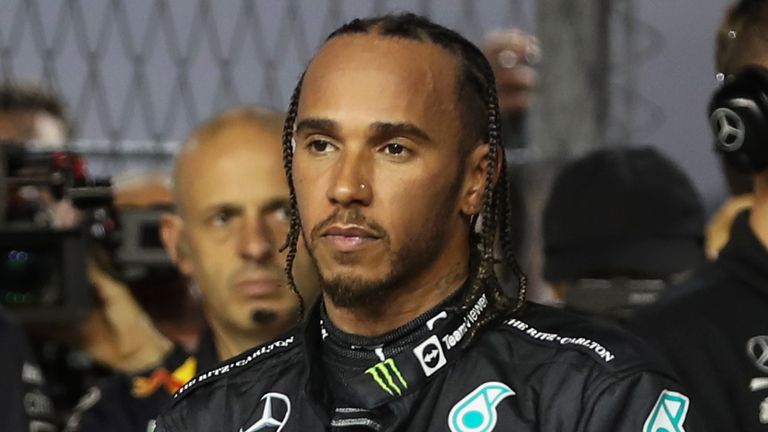

Seven-time Formula One World Champion Lewis Hamilton has candidly revealed that he has battled with mental health issues for most of his life. The British racing icon, widely regarded as one of the greatest drivers in Formula One history, admitted that he has struggled with depression since his teenage years, largely due to bullying, the pressure of racing, and racial challenges growing up in the UK.
In a deeply personal interview with The Sunday Times, Hamilton opened up about the emotional and psychological struggles he has faced, shedding light on the hidden side of the sport and the toll it has taken on him both on and off the track. Despite his fame and success, Hamilton revealed that his journey to the top has been far from easy, marked by moments of intense personal hardship that he has worked to overcome throughout his career.
Struggles with Mental Health and Bullying
Hamilton’s battles with mental health started at a young age. The 39-year-old, who has dominated Formula One since making his debut in 2007, spoke candidly about the depression he faced starting from his early teens. “I’ve had depression. From a very early age, when I was, like, 13,” Hamilton shared.
Growing up in Stevenage, a town in Hertfordshire, Hamilton faced bullying, both because of his race and his passion for a sport that wasn’t widely represented in his community. As a child of mixed-race heritage, Hamilton was often targeted with racist taunts, which compounded the challenges of fitting in at school. His experiences of racism and bullying as a young boy left a deep emotional scar, something Hamilton has carried with him throughout his life.
“Having mixed-race parents, I would often be the only person of color in a room, and I felt like an outsider,” Hamilton reflected. “At school, there was bullying, and at the time, there wasn’t really anyone I could talk to about it.”
Despite these struggles, Hamilton found solace and escape in racing, but the sport itself brought its own pressures. From a very young age, Hamilton was thrust into the intensely competitive world of motorsport, where the pressure to perform was immense. The psychological toll of balancing these internal and external pressures is something that has stayed with him, even as he rose to the pinnacle of the sport.
Pressure of Racing and the Pursuit of Perfection
As Hamilton moved through the ranks in Formula One, the pressure only intensified. His rise to become the sport’s most successful driver was accompanied by the constant need to maintain peak performance. This relentless pressure, combined with the personal battles he faced, took a toll on Hamilton’s mental well-being.
“There were really difficult phases when I was in my 20s,” Hamilton confessed. “I’ve struggled with mental health through my life, especially when I was younger. I was under a lot of pressure to succeed, and that, combined with the struggles at school, made it tough. The mental toll of racing, constantly having to perform and be the best, can be overwhelming.”
The constant public scrutiny of his every move, on and off the track, only added to the burden. With the entire world watching his every race, Hamilton was often expected to be perfect, and that unrealistic expectation took a toll on his mental health. “I had no one to talk to,” he said, underscoring the isolation he felt during these dark moments.
While Hamilton has always been a fiercely competitive and focused athlete, the intense emotional strain of trying to balance his personal challenges with the demands of Formula One had a significant impact on his mental health throughout his career.
Finding Peace and Healing Through Meditation
A turning point in Hamilton’s mental health journey came during the COVID-19 pandemic. In 2020, while the world was in lockdown, Hamilton took a step back from the fast-paced world of racing to reflect and prioritize his well-being. It was during this period of soul-searching that he began to develop healthier habits to cope with stress and anxiety.
Hamilton revealed that he began waking up at 5 a.m. every day to meditate and go for a run, practices that have since become an integral part of his daily routine. “I would struggle initially to calm my mind, but meditation became a really great way of getting in touch with myself, my inner feelings,” he said. “It allowed me to understand what I could do and how I could manage my emotions.”
The practice of meditation, in particular, has proven transformative for Hamilton. In the past, he struggled with managing his emotions during difficult times, but over time, meditation has helped him gain better control over his thoughts and feelings. “It’s a really great way of resetting and clearing the mind. It’s important to me to stay in touch with myself,” he added.
While the pressures of racing have not entirely disappeared, Hamilton now sees meditation as an essential tool for maintaining his mental clarity, composure, and focus—both on and off the track.
Therapy and Seeking Help
Despite his success and the accolades that have come with it, Hamilton acknowledged that seeking professional help has not always been easy. He revealed that he spoke to a therapist years ago, but that experience was not particularly helpful at the time. “I spoke to one woman, years ago, but that wasn’t really helpful,” he said.
Though he has not pursued therapy extensively, Hamilton emphasized the importance of mental health support in general and expressed a desire for better mental health resources for athletes. “Mental health is something that is not talked about enough in sport. As athletes, we often just push through pain and exhaustion. But there needs to be more focus on the mental side of things,” Hamilton said.
His openness about his struggles could serve as a powerful message to other athletes, particularly young people in sports, who may feel they are alone in facing mental health challenges. As one of the most prominent athletes in the world, Hamilton’s willingness to speak out about his own battles could help de-stigmatize the conversation surrounding mental health in elite sports.
A New Chapter: Ferrari and the Future
Looking ahead, Hamilton’s future in Formula One is set to take a new direction. After spending 12 years with Mercedes, where he has won six of his seven World Championships, Hamilton is set to make a high-profile move to Ferrari at the end of the 2024 season. The move marks a new chapter in his illustrious career, one that will undoubtedly come with its own set of challenges.
As Hamilton prepares for this new chapter, it’s clear that his experiences with mental health have shaped his approach to racing and life. While he continues to compete at the highest level, Hamilton is more focused than ever on maintaining his mental well-being, embracing healthier practices, and encouraging others to prioritize their own mental health.
At the same time, Hamilton’s legacy in Formula One is already secure. His incredible career, resilience, and determination have made him a global icon. And now, his openness about his mental health struggles may serve as an additional source of inspiration for fans and athletes around the world.
As he looks ahead to the future, Hamilton remains a fighter—on the track, and in life.
Leave a Reply